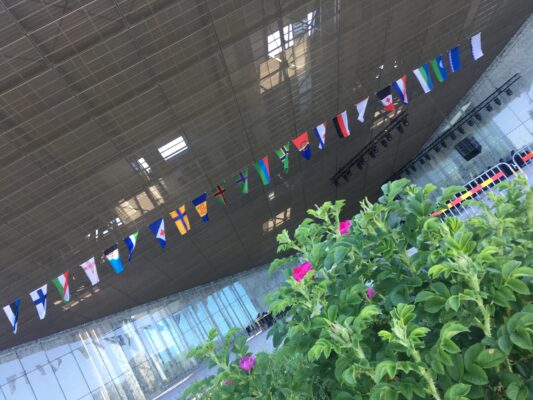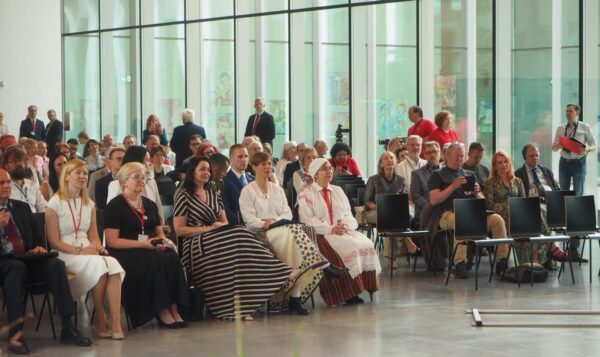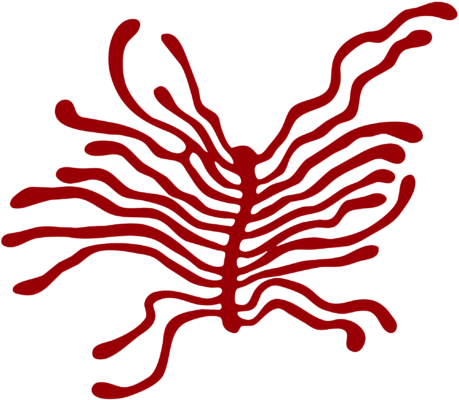
Resolution 2004
Resolution of the IV World Congress of Finno-Ugric Peoples
Resolution of the IV World Congress of Finno-Ugric Peoples
The 4th World Congress of Finno-Ugric Peoples declares that its primary objective is the preservation and development of the Finno-Ugric and Samoyed peoples and their cultures as part of the heritage of the whole mankind. The World Congress is aware that the resolution of the problems of assimilation and loss of national identity mainly depends on the policy of states and the attitude of young people to their culture, language and history.
The Congress states that the protection of human rights, and the rights of indigenous peoples and national minorities, is not a question of the country’s domestic policy only but also of the whole international community.
Therefore it is important, in addition to including the international human rights standards and the rights of national minorities into national legislations, to use the mechanisms of international legal instruments which do not require ratification by states and are directly binding.
Promising in this respect is the cooperation of all the countries via different international organisations, above all the Council of Europe and the OSCE, and of Hungary, Finland and Estonia also in the framework of the European Union.
Of late, there has been a reduction in the number of population of most of the Finno-Ugric and Samoyed peoples, and the sphere of use of their languages is decreasing. It is, above all, the younger generation that has suffered where it is deprived of opportunities for socialisation in their own national cultures.
Taking into account the existing situation, the Congress considers it necessary to take the following measures:
In the field of ethnopolitics and law
- The Congress entrusts the Consultative Committee with approaching the Commissioner on Human Rights of the Council of Europe with a request to set up a permanent forum on the issues of indigenous peoples and national minorities in Europe.
- The Congress commissions the Consultative Committee to act as the coordinator for monitoring the international obligations concerning the protection of human rights and the rights of indigenous peoples and national minorities in the countries of settlement of Finno-Ugric and Samoyed peoples.
- The Congress calls on Hungary, Russia, Finland, Estonia and other states where Finno-Ugrians have been living traditionally, to ratify the ILO Convention (No.169) concerning Indigenous and Tribal Peoples in Independent Countries. Pending the ratification of that convention Before the above Convention is ratified, it is necessary to improve the legislative framework for ensuring the rights specified therein and, above all, the right to use natural resources including minerals.
- The Congress commissions the Consultative Committee of Finno-Ugric and Samoyed Peoples to strengthen cooperation with international organisations dealing with human rights and the rights of national minorities and indigenous peoples, proactively involving young people into the process.
- The Congress commissions the Consultative Committee to establish a network of information and legal centres for studying national legislations and international regulations on human rights and the rights of indigenous peoples and national minorities.
- The Congress is concerned about the lack of a federal state body for coordinating the ethnic and interethnic relations in such a multinational state as Russia, and calls on the Government of the Russian Federation to re-establish the Ministry of Nationalities.
- The Congress expresses its concern about the processes entailing the elimination of national autonomous formations. It commissions the Consultative Committee to keep track of the implications of the unification of the Permian Komi Autonomous District and the Perm Oblast.
In the field of languages and education:
- The Congress considers that the rights of Finno-Ugric and Samoyed peoples should be based on international regulations including the European Charter for Regional or Minority Languages, and calls on the states which have not ratified the above document to do it as soon as possible.
- The Congress calls on parliaments and governments of Hungary, Russia, Finland, Estonia and other countries where Finno-Ugrians and Samoyeds have being living traditionally, to continue cooperation in the field of state policy of supporting the languages and cultures of the Finno-Ugric and Samoyed peoples.
- The Congress commissions the Consultative Committee to promote the setting-up of a database on successful teaching and educative techniques, and the introduction of such techniques in teaching native languages to children using advanced training technologies.
- The Congress encourages the activities in the area of education and advanced training of professionals for the Finno-Ugric and Samoyed regions by the leading educational centres of Hungary, Russia, Finland and Estonia. It draws the attention of administrations of these regions to the need to more effectively use the potential of ethnic professionals.
- The Congress stresses the continuing loss of their native languages by Finno-Ugric and Samoyed minorities. For a people to survive, it is not enough to teach its native language as a separate subject. It is necessary to expand the network of schools for nationalities and, as the first step, to increase the number of hours provided in the curriculum for teaching the native language.
- The Congress expresses its disagreement with the practice of closing of the so-called small schools in the territories of settlement of the Finno-Ugric minorities.
In the field of culture:
- The Congress considers it necessary to continue the practice of international folk, ethnofuturistic and theatre festivals, days of kindred peoples, celebration of memorable dates and anniversaries.
- The Congress commissions the Consultative Committee to render assistance in publishing books in the Uralic family languages.
- The Congress recommends to intensify organisation of youth activities for the purpose of studying the languages and cultural heritage, and learning modern patterns of folk arts.
- The Congress considers it necessary to preserve the traditional culture and transfer it to the younger generations using advanced technical facilities.
In the field of public health, demography, and ecology:
- The Congress emphasises that the state must ensure for everyone the right to obtain representative information on his or her ethnic group in accordance with the national standards of statistics.
- The Congress considers it necessary to establish international data interchange (including scientific conferences, etc.) regarding the state of health of the Finno-Ugric and Samoyed peoples, environmental protection problems, and cultural and educational policy.
- The Congress commissions the Consultative Committee to hold an international workshop on the results of the all-Russian population census of 2002.
In the field of media and information systems:
- The Congress commissions the Consultative Committee to intensify its work in exchanging information and developing its own mass media and databases, including electronic media, with a view to create the common information space in the field of environmental, public health, educational, and cultural problems.
- The public agencies must ensure for the peoples the existence of mass media in their mother tongues to cover all life spheres and accessible to the largest audience possible.
The Congress recommends to the Consultative Committee to organise in 2006 an international conference of Finno-Ugric and Samoyed peoples for analysing the intermediate results of fulfilment of the recommendations of this Congress providing for the wide coverage of the outcome of the conference in the media.
The Congress commissions the Consultative Committee to study the appeals, comments and suggestions addressed to the Congress.
The Congress states that the accession of Estonia and Hungary to the European Union is a very encouraging event. The ongoing dialogue between the European Union and the Russian Federation also opens new horizons for cooperation between all the Finno-Ugric and Samoyed peoples. The active involvement of youth in these processes gives a new impetus to our movement.
Tallinn, 2004


